GP suppliers working on access target

Functionality to allow patients to view their detailed, coded GP record online is available in more than half of England’s practices and will hit more than 85% this month.
Emis Health practices have been live with the functionality since August and TPP is due to go-live “any day”, said Alan McDermott, NHS England’s programme director for the Patient Online programme, at EHI Live 2015 in Birmingham today.
Together, these GP system suppliers cover more than 85% of practices in England. Giving patients online access to their health records is a long-standing pledge from politicians that has recently been driven forward in primary care through the GP Systems of Choice framework and contract changes for GPs.
The GP contract for 2014-15 said 95% of GPs had to be able to offer patients online access to a summary of their GP record by April this year.
The contract for 2015-16 says GPs have to be able to offer patients access to their detailed, coded medical record by April 2016.
McDermott said the four principal GP IT suppliers have been working to get the functionality live to allow GPs to fulfil their contractual obligation.
While Emis Health has been live since August, TPP is due to go-live this month and INPS and Microtest are on track to start rolling out early next year.
McDermott said that each supplier has agreed the set of coded information that will be made available.
“We have a definition of the detailed coded record,” he said. “We are not at the point of identifying the 50,000 codes that might be used, but those elements of the record that are of most interest to patients will be presented by each key supplier as summary information relevant to clinicians and patients.”
This means that the record available to patients will differ slightly, depending on which IT supplier their GP uses.
NHS England and the Health and Social Care Information Centre are also working with the BMA and RCGP joint GP IT committee on agreeing a standard set of coded information.
This, along with open APIs that are being developed by the principal suppliers, would allow third party suppliers to offer a records access service.
Under the new GPSoC contract the four principal suppliers are working on open APIs to allow subsidiary providers to access patient data and present it to patients, with the aim of encouraging a wide range of innovative apps.
This aligns with health secretary Jeremy Hunt’s aim to have 15% of smartphone users accessing NHS services, such as records access, via apps by 2018.
NHS England has previously told Digital Health News that the interface mechanisms to allow the first integration of patient-facing services will be finished by the end of this year.
McDermott said agreeing a common set of data available as the ‘detailed record’ will be the next step after that. “Open APIs will provide a much richer range of options to patients,” he told Digital Health News.
“The second stage is to define a single standard across all back end clinical systems. In the meantime we are working with what’s available and it will look a little different depending on the supplier, but the value is that it’s what practices are used to and they are the ones explaining the information to patients.”
Despite more than half of English practices being able to offer the service to patients now, McDermott said detailed record access is not being pushed yet at a national level.
He said there is still work ongoing with the RCGP to produce a guide to support practices looking to implement the latest stage of records access, but he expects this to start over the next few months.
McDermott also provided some figures around other online transactional services being offered by GPs.
He said that in August 2015, 34 million GP appointments were available, of which 4 million were available online and 1 million were actually booked by patients online. There are also around 1.2 million repeat prescriptions ordered online every month.
However, he said there continues to be a large disparity between practices that are making active use of these online services and promoting them to patients, and others that do not use them at all.
There are still around 1,100 practices that do not actively use online booking and 960 that do not offer online ordering of repeat prescriptions, despite having the technology available to do so; and these services being heavily promoted by central policy and the GP contract.



